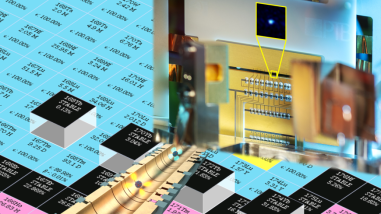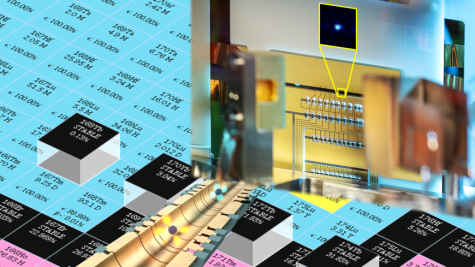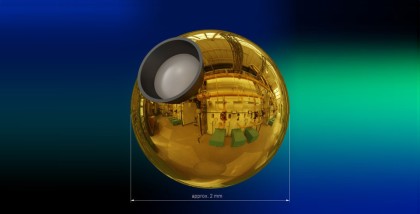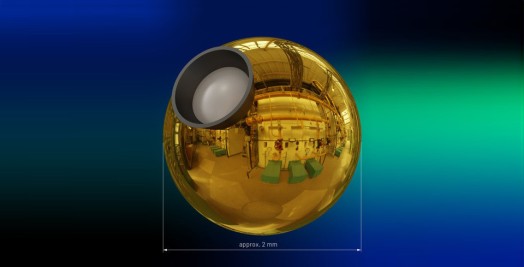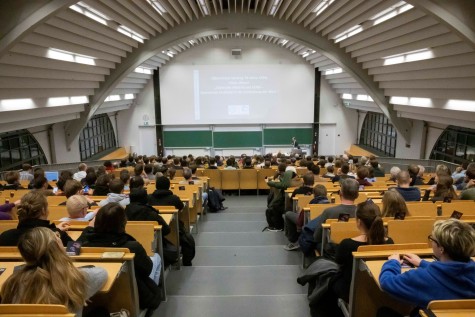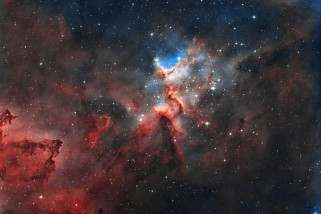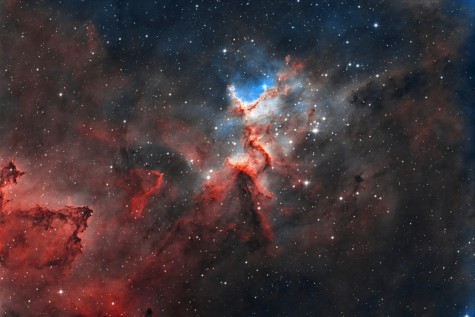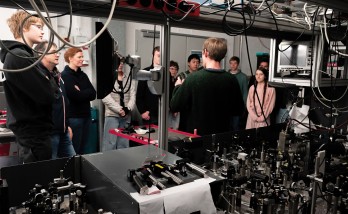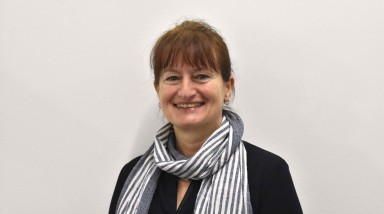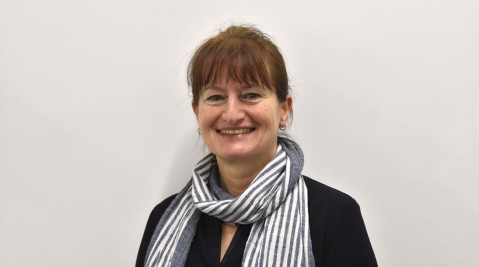-
![]() Picture: rawpixel -stock.adobe.com/Dominik Pfeiffer
Picture: rawpixel -stock.adobe.com/Dominik Pfeiffer![]() Picture: rawpixel -stock.adobe.com/Dominik Pfeiffer
Picture: rawpixel -stock.adobe.com/Dominik PfeifferAtomic traffic control
2025/02/14
TU researchers have developed and tested a novel technology for even more precise quantum sensors
UNESCO's International Year of Quantum Science and Technology begins with a success for TU researchers at the Institute of Applied Physics: Physical Review Research publishes results of their research on dichroic mirror pulses. These act like velocity-selective traffic controllers for atoms by directing the particles with correct velocity towards detection while letting run troublemakers into the void.
-
![Schwenk_Yb-iso-shifts_high-res_Fig-1]() Picture: MPIK | PTB | Brookhaven National
Picture: MPIK | PTB | Brookhaven National![Schwenk_Yb-iso-shifts_high-res_Fig-1]() Picture: MPIK | PTB | Brookhaven National
Picture: MPIK | PTB | Brookhaven NationalNew insights into the structure of atomic nuclei
2025/02/13
In the search for “dark forces”, physicists came across deformed nuclei
When world-leading teams join forces, new findings are bound to be made. This is what happened when quantum physicists from the Physikalisch-Technische Bundesanstalt (PTB) and the Max Planck Institute for Nuclear Physics (MPIK) in Heidelberg combined atomic and nuclear physics with unprecedented accuracy using two different methods of measurement. Together with new calculations of the structure of atomic nuclei, theoretical physicists from the Technical University of Darmstadt and Leibniz University Hannover were able to show that measurements on the electron shell of an atom can provide information about the deformation of the atomic nucleus. At the same time, the precision measurements have set new limits regarding the strength of a potential dark force between neutrons and electrons. The results have been published in the current issue of the scientific journal “Physical Review Letters”.
-
![Bildgebung-Roentgenpulsen]() Bild: Stacy Huang / Adobe Stock Deeplab
Bild: Stacy Huang / Adobe Stock Deeplab![Bildgebung-Roentgenpulsen]() Bild: Stacy Huang / Adobe Stock Deeplab
Bild: Stacy Huang / Adobe Stock DeeplabMomentaufnahmen auf atomarer Ebene: Neue Bildgebung steigert die Sensitivität
2025/02/10
Mithilfe von Röntgenpulsen im Attosekunden-Bereich konnten Wissenschaftler*innen die Helligkeit und Auflösung von Aufnahmen ultraschneller Prozesse in ihrer natürlichen Umgebung erhöhen.
-
![Experimentaufbau_High_Intensity_Gamma-ray_Source]() Bild: Dr. Udo Friman-Gayer
Bild: Dr. Udo Friman-Gayer![Experimentaufbau_High_Intensity_Gamma-ray_Source]() Bild: Dr. Udo Friman-Gayer
Bild: Dr. Udo Friman-GayerGrundlegende Schwingung in Atomkernen entschlüsselt
2025/02/10
TU-Forschungsteam gelingt präzise Bestimmung der Kernform
Wissenschaftler:innen der TU Darmstadt haben erstmals das komplexe Verhalten der sogenannten Dipol-Riesenresonanz in ungewöhnlich geformten Atomkernen detailliert untersucht. Die Ergebnisse der Arbeitsgruppe um Professor Norbert Pietralla am Institut für Kernphysik wurden kürzlich im renommierten Fachjournal „Physical Review Letters“ veröffentlicht.
-
![Fusionstarget_2]() Bild: Focused Energy
Bild: Focused Energy![Fusionstarget_2]() Bild: Focused Energy
Bild: Focused EnergyBMBF fördert die Fusionsforschung an der TU Darmstadt
2025/02/03
Die Kernfusion gilt als vielversprechende Energiequelle der Zukunft.
Für die Forschung in diesem Bereich verfügt die TU Darmstadt seit langem über besondere Expertise. Das Bundesministerium für Bildung und Forschung (BMBF) fördert nun ein Verbundprojekt zur Untersuchung grundlegender Phänomene der lasergetriebenen Trägheitsfusion, an dem die TU beteiligt ist.
-
![]() Bild: Klaus Mai
Bild: Klaus Mai![]() Bild: Klaus Mai
Bild: Klaus Mai70 Jahre CERN: Einblicke in die Entstehung der Welt
2025/01/06
Feierliches Jubiläum mit Vortrag und Ausstellung am Institut für Kernphysik
Am 03. Dezember 2024 war es endlich soweit: Das Institut für Kernphysik (IKP) der Technischen Universität Darmstadt blickte gemeinsam mit zahlreichen Gästen und Wissenschaftler:innen auf 70 Jahre CERN zurück und feierte in einer öffentlichen Abendveranstaltung mit über 300 angemeldeten Gästen die zentrale Rolle des europäischen Forschungszentrums für Kern- und Teilchenphysik in der Entwicklung unserer modernen Wissenschaft. Der Abend begann mit einem herausragenden Vortrag von Professor Klaus Blaum, der die Anwesenden mitnahm auf eine spannende Reise zu den Geheimnissen der „exotischen Materie“ und der Entstehung der Welt.
-
![]()
![]()
TUdiscover – Warum leuchten Sterne?
2024/12/16
Jetzt anmelden zum Osterferien-Programm für Mädchen der 5. – 7. Klasse
Wir freuen uns, Ihnen das spannende Ferienprogramm „TUdiscover“ vorzustellen, das der Fachbereich Physik der TU Darmstadt in den kommenden Osterferien anbietet. Das Programm richtet sich speziell an Schülerinnen der 5. bis 7. Klasse und lädt sie ein, eine Woche lang die faszinierende Welt der Sterne, des Lichts und der Physik zu erleben.
-
![]()
![]()
Starry Night – Winter Edition
2024/12/16
An interactive journey into the depths of the universe with the telescopes of the TURM Observatory
Have you ever seen the birthplace of stars or the remains of a stellar explosion? An interactive journey into the depths of the universe awaits you at the Starry Night – Winter Edition.
-
![]() Bild: Paul Glogowski
Bild: Paul Glogowski![]() Bild: Paul Glogowski
Bild: Paul GlogowskiPhysik-Olympiade feiert Premiere an der TU
2024/11/15
-
![]()
![]()
Professor Regine von Klitzing has been awarded the Gentner-Kastler Prize
2024/11/15
Department of Physics
Archive
Archive



